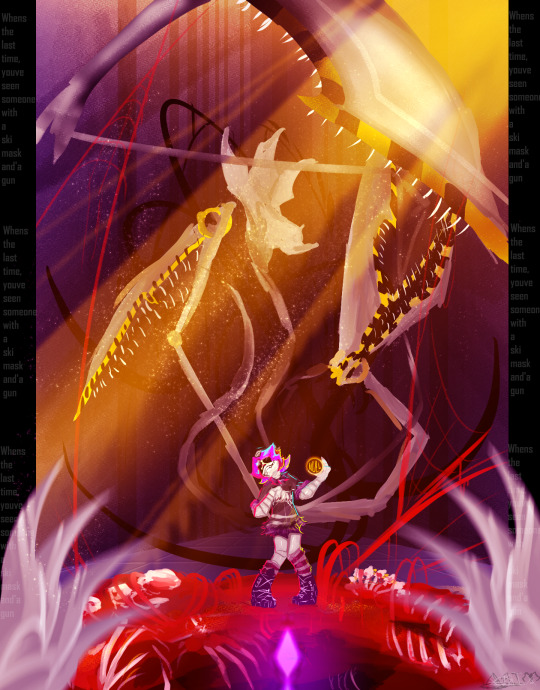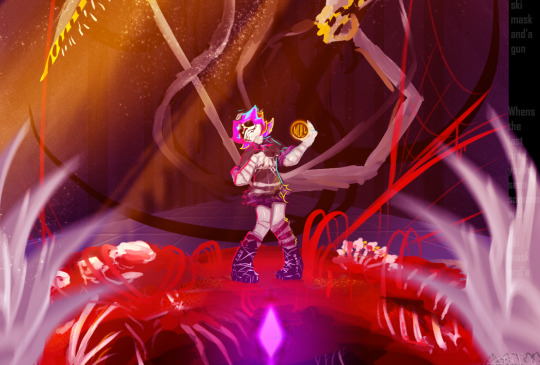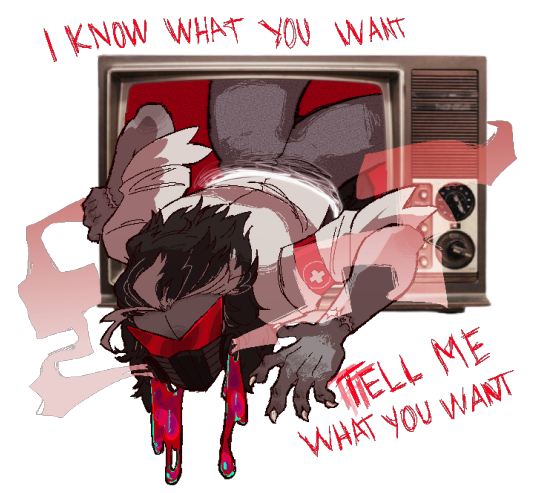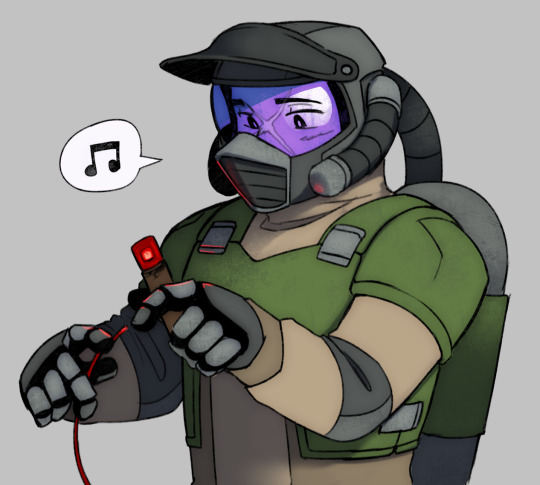#combat systems
Text
CRASH COURSE IN WRITING MAGIC SYSTEMS THAT NOBODY ASKED FOR
Disclaimer: I reference some popular media in this post to use as examples of what and what not to do when writing magic systems in fiction. In spite of my horrible sense of humor, understand that I’m not berating any series, I’m just making a point. Like what you like.
AHEM.
In a medieval or ancient fantasy world, magic is a staple, and while it can be a challenge at times to work with a magic system, I’ve found that effective magic systems have three clearly established factors playing into them. These factors are as follows:
1. Rules and Limits
2. Plausible Purpose and Canonical Background
3. CONSISTENCY
1. Rules and Limits. When it comes to writing a magic system, I feel that the most daunting part of it is the sheer amount of freedom you have with it. It’s to your custom. There are no rules until you set them, and if you don’t set firm rules in your magic system, you end up with a weird free for all that makes your story fall flat. The hero needs to reach the peak of some secluded mountain to battle an ancient wizard threatening to destroy the world? Let’s just teleport to the guy and hit him a few times with lightning until he dies! That’ll do it! With logic like that, you have a story that lasts less than 10,000 words. And no lonely soul in the wee hours of a Sunday morning is going to want to read that to pass the time.
This is why rules and limitations are vital to any magic system. Say your aforementioned hero (who is currently trying to reach that wizard but has no clue where he is) works with magic or has a sidekick who works with magic. Now say that this world does have teleportation magic, which is pretty OP. How do we limit it? Well, maybe teleportation, although possible, is dangerous because it makes the user tired, which is pretty impractical when you’re getting ready to have a final showdown with an all-powerful wizard. This could lead to a side arc that the hero must go through in order to reach the pesky wizard, therefore adding conflict to the story and opportunities to meet new characters, develop your world, and lengthen your adventure.
Earlier seasons of The Fairly Odd Parents come to mind. For those who grew up watching Butch Hartman’s brainchild, you might remember Da Rules, a huge book full of all the rules a godchild and his fairies must follow during their partnership. While rules are made up on the spot in some episodes, there are quite a few that stick around throughout the series and act as a hindrance in Timmy’s hare-brained schemes. In one early episode, Timmy wishes that he was the best skate-boarder in the world. This is fun, until he is challenged by his evil babysitter to a skating contest. Because of the stated rule that he can’t make wishes to win contests, Timmy is stripped of his magical skills, and is forced to git gud on his own in order to beat Vicky. If it weren’t for this simple rule being established early on in the series, the episode would have never happened at all. It’s a simple and childish example, but it gets the point across well enough.
Put bluntly, limitation and necessity are the parents of invention. If you don’t have rules, you don’t have conflict, and if your story doesn’t have conflict, then you don’t have a story.
2. Plausible Purpose and Canonical Background. Why does your world even have magic in the first place? Why does it exist? How does it exist? How does it affect your story and the characters in it? If it’s just a background element or plot device, either edit it out of your story, or rework your story to make it important, if you want magic so badly. If characters rely on magic for their way of life, make it clear how magic affects people and how they use it in their day to day lives. If magic isn’t a common occurrence, do people fear and shun it? This could be a driving force in your story.
To add to this, magic systems are about as interesting as their origins are. Magic doesn’t just exist. That’s not unique. It should have some kind of explanation to it. Even if it’s vague, it’s fine, if there’s a good enough reason. Maybe no one knows its true origins and so it’s only crazy theories that exist, which could be up to the reader to determine magic’s origins in that world. Open-ended world-building and characterization can be interesting, if done well.
The Elder Scrolls V: Skyrim is a good example. Skyrim introduces a new magic system to the Elder Scrolls series; the Thu’um. To put it bluntly, the Thu’um is an ancient school of magic that was used only by Dragons. Humans couldn’t use it until a goddess allowed them to use it to fight the Dragons in ancient times, because without it, humans had no chance of overthrowing their cruel masters. Canonically, the Thu’um is a very powerful kind of magic, which at one point was used to break a piece of Skyrim off during a battle between two Dragon Priests, Miraak and Vahlok. The story behind the human use of the Thu’um is pretty metal, and therefore, interesting! While it doesn’t have to be quite that brutal, there should be an interesting story to the magic, which could also play into the rules limiting the use of that magic. Using Skyrim as an example again, while humans can use the Thu’um, it requires decades of training to actually do anything with it because the practice is not natural to humans like it is to Dragons. While a handful of mortals have been born with the ability to use the Thu’um without much training at all, only very few have existed in history, and even fewer actually used their gift. The magic is insanely powerful, but has strict limits and rules, depending on who is using, limiting the amount of people who can use it.
Use of the magic system shouldn’t be all the same either. There are different people who are going to practice it, and those different people are going to have different perspectives on the craft. A great example to look at is bending in Avatar: The Last Airbender. While the bending of elements in the show is technically a martial art, it’s treated like a magic system. Each nation has its own style when dealing with their respective element. Waterbenders are more fluid in their motions when waterbending, while earthbenders are very rigid and forceful when they’re chucking rocks at your face. Firebenders are offensive and aggressive, while airbenders are defensive and agile, preferring avoidant tactics in combat. Variations exist, such as the three main Waterbending styles, according to Wan Shi Tong; Northern Style, Southern Style, and Foggy Swamp Style. Some intellectualoids like Toph are knowledgeable enough to make brand new techniques completely unheard of in their craft in the form of metalbending, lavabending, bloodbending, and lightningbending. Others, like Iroh, are even able to borrow from other elements to come up with completely new techniques, like lightning redirection and using different parts of the body to firebend when the limbs are bound. Having multiple ideals in a world not only creates organic diversity, but also opens the doors to conflict. What if two kinds of magic users with differing ideologies clash? What kind of chaos could ensue?
3. CONSISTENCY. It’s pretty simple on paper, but writers seem to struggle with keeping their magic systems consistent. A small example in High Guardian Spice would is the portal magic introduced in the first episode by Aloe. If you have a portal that can take you from Point A to Point B with no established limits, why didn’t Sage and Rosemary just teleport from their hometown to the Academy? When the girls get trapped in a cave, why didn’t they just magic their way out using portals? Avoiding plot holes is easy if you stay consistent. If you write yourself into a corner, consider reworking the previous two factors in your story. To prevent writing yourself into a corner, plan your novel out before you write it, and don’t be afraid to rework some things if you get stuck. They’re called drafts for a reason!
This little brainbarf boils down to:
You make the rules in magic systems. Those rules can be whatever the heck you want, but to make a good product, you need to stick to the rules you set, and still find a way to make it interesting.
Take everything I say here with a grain of salt, as I’m mainly a fanfiction writer, however I have worked with fantasy games, and have rewritten some magic systems to make them more “novel-friendly”. (*cough cough* Skyrim, I’m lookin at you *cough cough*)
Just understand that everything I said is entirely correct and valid and if you think otherwise, you are automatically wrong in every way.
I can provide examples of my own work with magic systems, if anyone is curious. I can also write up a part two, if anyone is open to discussion!
19 notes
·
View notes
Note
Honestly, my only complaint with Reload is how limited the AI feels.
In the og it could act freely, we could give the characters direct commands (my preferred one honestly), focus on knocking down a target, heal/support, attack the fallen enemies, conserve sp, assign a specific target and stand by (I still dont know why thats in the game but-)
In reload we can only do like half-
Understandable, I don't have an issue with the combat systems. But as you say is what you prefer.😊
6 notes
·
View notes
Text
According to Aviation and Defense Market Reports, Submarine Combat Systems engage hostile targets with the help of advanced sensors and weapon systems
#submarine combat system#communication with submarines#submarine controls#combat submarine#combat systems
0 notes
Text
Hi gangy!!!!!!!!!!!

A little closeup under the cut bc i like it!!

#murder drones#ibeg art#murder drones art#uzi md#md uzi#murder drones uzi#md episode 7#I need to draw mdness combat like right now but I had to get the md out ofmy system#nuzi
217 notes
·
View notes
Text

HEAVILY inspired by I KNOW WHAT YOU WANT! - Remix by Asteria, 6arelyhuman and kets4eki (Give it a listen, it's very good)
First thing I've drawn in a good long while...
THIS IS ALTER ART, NOT FANART. DO NOT TAG AS KIN.
#;Reaper#system stuff#alter art#madness combat#2bdamned#madness combat art#madcom#madcom art#madcom doc#madcom 2bdamned#;moth.art
240 notes
·
View notes
Photo

for the longest time ive said “i’ll start playing genshin just to get him” well guess who’s back on rate-up, and guess who made an account today and then couldn’t beat enough of the tutorial to get the gacha currency to actually pull. and so still doesn’t have him
#i think doing the genshin combat on ipad is the worst gaming experience known to man actually#but i will do anything for an anime boy who is also a dog.#edit: it turns out i will do anything Except force myself to play more genshin because this has been the worst gameplay experience of my lif#y'all do this WILLINGLY? like for FUN?? i felt like i was being actively bullied by the camera tracking#also ive been playing the game for like 5 full hours and ive managed to wish 8 times in total. which is insane.#is it not enough that the gameplay is tedious and unrewarding. the gacha system must ALSO be tedious and unrewarding?#anyway im giving up on the dog you guys enjoy him though#fanart#gorou#people!#genshin impact
2K notes
·
View notes
Text

making things. playing. having fun.
#hermitcraft#hermitcraft fanart#mcyt#mcyt fanart#fanart#xisumavoid#xisuma#xisuma fanart#xisumavoid fanart#digital art#eliyipsart#the usual gauntlets i give him feel too combat-oriented#if that makes sense#so im exploring new designs :)#i imagine he has some sort of system in place to allow for as much physical sensation as possible in his hands despite the gloves#good for precision redstone. also good for just general quality of life when you're wearing a fullbody suit all the time
216 notes
·
View notes
Text
Yknow how MB says that SecUnits are “cheaply produced, and we suck” yet kicks extreme amounts of ass? Well I think MB is comparing itself to Combat SecUnits, which could shrug off hits like it was nothing (from the one example we have at least)
#it at least sort of fixed the issue of secunits apparently being really bad but also the pinnacle of human engineering and security#I don’t really like how that detail is inconsistent#anyways do y’all have any ideas#murderbot#the murderbot diaries#all systems red#exit strategy#secunit#combat secunit
114 notes
·
View notes
Text


Preordered Unicorn Overlord after playing the demo twice
#unicorn overlord#I still wish they took writing inspiration from Ogre Battle like the combat system itself not from FE Shadow Dragon🥲
123 notes
·
View notes
Text
This is not only about FCG, but it is definitely about FCG.
Something I've always found incredibly attractive about fantasy narratives is that it's a safe space to explore heroic sacrifice. In real life, dying for a cause, even if justified, is rarely so fitting and poignant, and it usually involves ponderous discussions and arguments and above all, paperwork. And as with all things death-related, it's simply easier in fiction, where the grief comes with the knowledge that you can and always will be able to access every moment you had with the deceased.
I'm far too tired and halfway into my cocktail to split the hairs of what is suicide vs. heroic sacrifice, and if they're different, and why; but on a high level the difference is conviction.
I think a lot of people are really uncomfortable with or even scared of conviction, even in fiction. It's come up in some talks about Midst. It comes up when people are suspicious of the Volition, more so than the Vanguard. It comes up with Orym. It comes up in D&D whenever people shy away from paladins, who are built upon this as a premise.
One can argue FCG died a paladin; one can argue he always made, in some ways, a better one than he was a cleric. It comes up when people question the motives of the Volition. Perhaps it's the confidence that shakes people, the idea that these characters can't be molded into an easier, more comfortable ideology that suits the viewer. Perhaps it's a different take on the Trolley Problem than mine.
I do think in real life, at least most of the time, there are more options - often very boring and unglamorous but ultimately more effective one. In fiction, however, the heroic sacrifice isn't just rife with dramatic possibility - which is, in fiction, far more important in my mind than having a clear moral or telling the audience that they're good and smart little children - it's also a chance, as Matt says, to redefine the stakes and reframe everything that's been going on, because one character decided what their stakes were. Perhaps that's what makes people balk: the amount of power it grants you despite the prohibitively high price.
#it's not limited to d&d but like. the scenario set up in this specific combat really can only exist in d&d#and i think if you don't like this sort of scenario you'd be better served and happier by finding other stories#tw suicide#cr spoilers#god. camlann had a great episode about this too this past week with a great twist#and daggerheart's death system is ultimately almost built on this
77 notes
·
View notes
Text
HEY DC X DP FANS
REMEMBER CALCULATOR??? THE CALCULATOR? Whatever the fuck his nerdy ass name was???
He like, was the villain equivalent of oracle in dc-online. And he’s like a character that I don’t think dc really uses often… (Yes I still play that- shut up)
Yeah, anyways-
Boom, make him Tucker. Or make Tucker him??
Tucker = The Calculator
Get it? Got it? Good.
then do whatever the fuck with that. Like- Danny could be a villain in training (dc-online story arc???)
Or maybe no one else knows, and then the bats find out and Tucker freaks the hell out
Or I dunno- Danny is a “villain” (but in the fun way, not so murderous) and ends up being recruited as one of the villain mentors (yknow; Lex, Joker, Circe)
(Since each is a counter to a hero; Superman, Batman, Wonder Woman. What if Danny’s the counter to another hero? Or even the counter to the entire Justice League Dark. I think it’d be pretty funny if he’s the counter to Flash or something)
And now he’s gotta mentor a bunch of villains-in-training who literally busted out of test tubes and have no memories from before… and god hes just adopting kids isn’t he?
maybe somehow Klarions here, too.
I rambled in the tags a lil bit btw…
#danny phantom#dp x dc#dc x dp#batpham#danny phantom crossover#dpxdc#dp x dc prompt#dpxdc prompt#I could also ramble about the power system in dc online#Because the actual options are magic combat | hand to hand combat | and powered combat#so I think metas fall under Lex | Superman#and Wonder Woman and Circe are magic#And then Joker and Batman are hand to hand combat#so then it’s like#Constantine falls under magic too#So introducing Danny as a big villain would be interesting#you have the option of making an ectoplasm section of the power dynamics#or maybe you could fit him under something else?#maybe we could specifically separate alien from meta and give meta to Danny?#And superman won’t run out of kids to mentor because all of the player characters in the game just wake up on brainiacs ship#so they could be from literally anywhere#which would also make the hero equivalent of him Flash#so like#literally perfect#i’m rambling
136 notes
·
View notes
Text

Murderbot out here dispensing free-bot code like it's Markus from Detroit Become Human.
#we should start keeping a tally on how many constructs it has freed by now#we got three tlaceys unit and that one sec unit in system collapse (sob sob)#theres probably more lets be honest#murderbot#the murderbot diaries#tmbd#secunit#secunit 3#it even tried to free that one combat unit in rogue protocol ffs
107 notes
·
View notes
Text

According to Aviation and Defense Market Reports, Submarine Combat Systems engage hostile targets with the help of advanced sensors and weapon systems
#submarine combat system#communication with submarines#submarine controls#combat submarine#combat systems#submarine combat
0 notes
Text

A ride in the snow (Larry Elmore cover for Fantasy Hero 4th ed, Hero Games, 1990)
#Larry Elmore#Fantasy Hero#fantasy#Hero System#Hero Games#fantasy art#fantasy RPG#Rob Bell#mounted combat#minotaur#fighter#winter scene#snow#mountains#1990s
144 notes
·
View notes
Text
Mamma mia here we go again…
So I have more thoughts because apparently there’s no bottom to the murderbot mindhole I’ve fallen down.
(Spoiler warning- minor stuff from several of the books, pls check tags etc.)
I’ve been reading a lot of things recently exploring Murderbot as an unreliable narrator, which I think is a cool result of System Collapse (because we all know our beloved MB is going through it in this one). There’s also been some interesting related discussion of MB’s distrust of and sometimes biased assessment/treatment of other constructs and bots.
And I’ve been reading a lot about CombatUnits! And I want to talk about them!!
Main thoughts can be summarized as follows:
We don’t see a lot about CombatUnits in the books, and I think what we do see from MB’s pov encourages the reader to view them as less sympathetic than other constructs.
I’m very skeptical of this portrayal for reasons.
The existence of CombatUnits makes me fucking sad and I have a lot of feelings about them!
I got introduced to the idea of MB as an unreliable narrator in a post by onironic It analyzes how in SC, MB seems to distrust Three to a somewhat unreasonable degree, and how it sometimes infantilizes Three or treats it the way human clients have treated it in the past. The post is Amazing and goes into way more detail, so pls go read it (link below):
https://www.tumblr.com/onironic/736245031246135296?source=share
So these ideas were floating around in my brain when I read an article Martha Wells recently published in f(r)iction magazine titled “Bodily Autonomy in the Murderbot Diaries”. I’ll link the article here:
(Rn the only way to access the article is to subscribe to the magazine or buy an e-copy of the specific issue which is $12)
In the article, Wells states that MB displaced its fear of being forced to have sex with humans onto the ComfortUnit in Artificial Condition. I think it’s reasonable to assume that MB also does this with other constructs. With Three, I think it’s more that MB is afraid if what it knows Three is capable of, or (as onironic suggests in their post and I agree with) some jealousy that Three seems more like what humans want/expect a rogue SecUnit to be.
But I want to explore how this can be applied to CombatUnits, specifically.
We don’t learn a lot about them in the books. One appears for a single scene in Exit Strategy, and that’s it. What little else we know comes from MB’s thoughts on them sprinkled throughout the series. To my knowledge, no other character even mentions them (which raises interesting questions about how widely-known their existence is outside of high-level corporate military circles).
When MB does talk about CombatUnits in the early books, it’s as a kind of boogeyman figure (the real “murderbots” that even Murderbot is afraid of). And then when one does show up in ES, it’s fucking terrifying! There’s a collective “oh shit” moment as both MB and the reader realize what it’s up against. Very quickly what we expect to be a normal battle turns into MB running for its life, desperately throwing up hacks as the CombatUnit slices through them just as fast. We and MB know that it wouldn’t have survived the encounter if its humans hadn’t helped it escape. So the CombatUnit really feels like a cut above the other enemies in the series.
And what struck me reading that scene was how the CombatUnit acts like the caricature of an “evil robot” that MB has taught us to question. It seems single-mindedly focused on violence and achieving its objective, and it speaks in what I’d call a “Terminator-esque” manner: telling MB to “Surrender” (like that’s ever worked) and responds to MB’s offer to hack its governor module with “I want to kill you” (ES, pp 99-100).
(Big tangent: Am I the only one who sees parallels between this and how Tlacey forces the ComfortUnit to speak to MB in AC? She makes it suggest they “kill all the humans” because that’s how she thinks constructs talk to each other (AC, pp 132-4). And MB picks up on it immediately. So why is that kind of talk inherently less suspicious coming from a CombatUnit than a ComfortUnit? My headcanon is that I’m not convinced the CombatUnit was speaking for itself. What if a human controller was making it say things they thought would be intimidating? Idk maybe I’ve been reading too many fics where CombatUnits are usually deployed with a human handler. There could be plenty of reasons why the CombatUnit would’ve talked like that. I’m just suspicious.)
(Also, disclaimer: I want to clarify before I go on that I firmly believe that even though MB seems to be afraid of CombatUnits and thinks they’re assholes, it would still advocate for them to have autonomy. I’m not trying to say that either MB or Wells sees CombatUnits as less worthy of personhood or freedom- because I feel the concept that “everything deserves autonomy” is very much at the heart of the series.)
So it’s clear from all of this that MB is scared of CombatUnits and distrusts them for a lot of reasons. I read another breathtaking post by @grammarpedant that gives a ton of examples of this throughout the books and has some great theories on why MB might feel this way. I’ll summarize the ones here that inspired me the most, but pls go read the original post for the full context:
https://www.tumblr.com/grammarpedant/703920247856562177?source=share
OP explains that SecUnits and CombatUnits are pretty much diametrically opposed because of their conflicting functions: Security safeguards humans, while Combat kills them. Of course these functions aren’t rigid- MB has implied that it’s been forced to be violent towards humans before, and I’m sure that extracting/guarding important assets could be a part of a CombatUnit's function. But it makes sense that MB would try to distance itself from being considered a CombatUnit, using its ideas about them to validate the parts of its own function that it likes (protecting people). OP gives what I think is the clearest example of this, which is the moment in Fugitive Telemetry when MB contrasts its plan to sneak aboard a hostile ship and rescue some refugees with what it calls a “CombatUnit” plan, which would presumably involve a lot more murder (FT, p 92).
This reminds me again of what Wells said in the f(r)iction article, that on some level MB is frightened by the idea that it could have been made a ComfortUnit (friction, p 44). I think the idea that it could’ve been a CombatUnit scares it too, and that’s why it keeps distinguishing itself and its function from them. But I think it’s important to point out, that in the above example from FT, even MB admits that the murder-y plan it contrasts with its own would be one made by humans for CombatUnits. So again we see that we just can’t know much about the authentic nature of CombatUnits, or any constructs with intact governor modules, because they don’t have freedom of expression. MB does suggest that CombatUnits may have some more autonomy when it comes to things like hacking and combat which are a part of their normal function. But how free can those choices be when the threat of the governor module still hangs over them?
I think it could be easy to fall into the trap of seeing CombatUnits as somehow more complicit in the systems of violence in the mbd universe. But I think that’s because we often make a false association between violence and empowerment, when even in our world that’s not always the case. But, critically, this can’t be the case for CombatUnits because they’re enslaved in the same way SecUnits and ComfortUnits are (though the intricacies are different).
There was another moment in the f(r)iction article that I found really chilling. Wells states that there’s a correlation between SecUnits that are forced to kill humans and ones that go rogue (friction, p 45). It’s a disturbing thought on its own, but I couldn’t help wondering then how many CombatUnits try to hack their governor modules? And what horrible lengths would humans go to to stop them? I refuse to believe that a CombatUnit’s core programming would make it less effected by the harm its forced to perpetrate. That might be because I’m very anti-deterministic on all fronts, but I just don’t buy it.
I’m not entirely sure why I feel so strongly about this. Of course, I find the situation of all constructs in mbd deeply upsetting. But the more I think about CombatUnits, the more heartbreaking their existence seems to me. There’s a very poignant moment in AC when MB compares ART’s function to its own to explain why there are things it doesn’t like about being a SecUnit (AC, p 33). In that scene, MB is able to identify some parts of its function that it does like, but I have a hard time believing a CombatUnit would be able to do the same. I’m not trying to say that SecUnits have it better (they don’t) (the situation of each type of construct is horrible in it’s own unique way). It’s just that I find the idea of construct made only for violence and killing really fucking depressing. I can’t even begin to imagine the horror of their day-to-day existence.
@grammarpedant made another point in their post that I think raises a TON of important questions not only about CombatUnits, but about how to approach the idea of “function” when it comes to machine intelligence in general. They explain that, in a perfect version of the mbd universe, there wouldn’t be an obvious place for CombatUnits the way there could be for SecUnits and ComfortUnits who wanted to retain their original functions. A better world would inherently be a less violent one, so where does that leave CombatUnits? Would they abandon their function entirely, or would they find a way to change it into something new?
I’ve been having a lot of fun imagining what a free CombatUnit would be like. But in some ways it’s been more difficult than I expected. I’ve heard Wells say in multiple interviews that one of her goals in writing Murderbot was to challenge people to empathize with someone they normally wouldn’t, and I find CombatUnits challenging in exactly that way. Sometimes I wonder if I would’ve felt differently about these books if MB had been a CombatUnit instead of a SecUnit. Would I have felt such an immediate connection to MB if its primary function before hacking its governor module had been killing humans, or if it didn’t have relatable hobbies like watching media? Or if it didn’t have a human face for the explicit purpose of making people like me more comfortable? I’m not sure that I would have.
Reading SC has got me interested in exploring the types of people that humans (or even MB itself) would struggle to accept. So CombatUnits are one of these and possible alien-intelligences are another. All this is merely a small sampling of the thoughts that have been swirling around in my brain-soup! So if anyone is interested in watching me fumble my way through these concepts in more detail, I may be posting “something” in the very near future!
Would really appreciate anyone else’s thoughts about all of THIS^^^^ It’s been my obsession over the holidays and helping me cope with family stress and flying anxiety.
#murderbot diaries#murderbot meta#artificial condition#exit strategy#fugitive telemetry#system collapse#murderbot spoilers#combat unit#FEELINGS#i blink and then it's 2000 words later#jesus christ
130 notes
·
View notes
Text

Some happy turtle bros for the soul
#tw eyestrain#decided to draw this to combat the nightmare I just woke up from#tmnt#tmnt 2012#teenage mutant ninja turtles#leo#leonardo#donnie#donatello#raph#Raphael#mikey#Michelangelo#2012 leo#2012 raph#2012 Mikey#2012 donnie#my art#system art#leo talks
70 notes
·
View notes